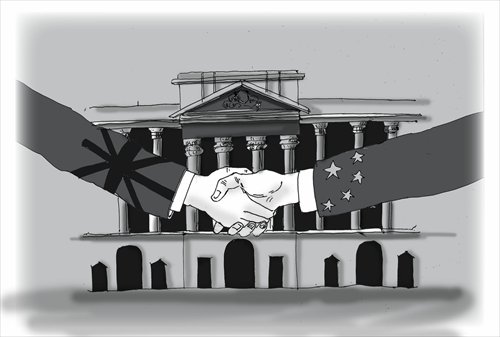UK aiming for win-win cooperation with China
Stronger ties set to benefit firms in both countries

Illustration: Luo Xuan/GT
President Xi Jinping's forthcoming state visit to the UK heralds a "golden era" in ties between China and Britain. During his trip to China in September, UK Chancellor of the Exchequer George Osborne stated China will become the center of the global economy and Britain not only welcomes the rise of China, but ought to be China's best partner in the West.
Despite a slowdown in China's economic growth, the UK government led by Prime Minister David Cameron believes that Britain sees enormous development potential ahead in China. The Chinese economy is projected by UK-based Standard Chartered to clock in at an average annual growth rate of 6.8 percent between 2010 and 2020. A few days ago, Osborne also stated at the IMF and World Bank annual meetings in Lima, Peru that in the next five years China's economy will remain an enormous contributor to global growth.
What's truly important is not only the growth rate, but China's economic transition that highlights new features such as a shift away from investment-driven toward consumption-driven growth. An increasing number of affluent Chinese investors have become enthusiastic about the British services sector, including its financial and creative industries. Additionally, British manufacturing companies are paying more attention to China. For instance, China is now the largest overseas market for sales of British cars.
Meanwhile, the UK is set to benefit increasingly from China's investment in the country, with the north of England in particular need of a new source of financial support. Cameron's government has announced plans to build a "northern powerhouse," and normal British citizens expect the government to honor its promise in the quickest time possible. Better construction of infrastructure, new energy resources and urban housing construction are all in need of investment from China.
Chinese companies will also help to build two nuclear plants in the UK, in which the Chinese companies are expected to hold a stake of 30-40 percent. The British government will also provide 2 billion pounds of financial support for the projects. Despite being confronted with doubts over the UK's partnership with China in developing nuclear projects, Amber Rudd, the UK energy secretary, stated that her country has a strong record in nuclear plant operation and a high level of nuclear oversight. She also said that as a confident and outgoing nation, the UK welcomes the participation of Chinese companies in its nuclear plant projects. Bilateral cooperation will enhance the productivity of the two economies and unlock the potential for both to co-invest in other markets. Funds and skills from China, coupled with the UK's top level of nuclear oversight, will allow companies from both countries to seek greater opportunities worldwide.
The city of Manchester, where there has been an influx of investment, will also be a significant stop for Xi in his UK visit. The Chinese president is found of soccer, so he will take pleasure in visiting football clubs in the city and will feel the pulse of the increasingly intimate economic ties between the city and China.
In addition to trade and investment, the two nations' cooperation in the financial arena is also attracting attention. China is stepping up the opening of its financial market to foreign investors, and the pace of the yuan's internationalization has picked up. The UK was the first country to sign a currency swap deal with China, and the first to issue yuan-denominated sovereign debt. China will also open the first overseas yuan-denominated sovereign debt market, reportedly in the UK. Cameron's government has spared no effort to introduce the yuan offshore trading business to London in an attempt to cement its role as the world's financial center.
British financiers mostly believe that the yuan's internationalization is in line with the general trend. Presently, the US represents less than 10 percent of global exports, but more than 80 percent of export deals are settled using the US dollar. This abnormal situation will be rebalanced sooner or later. Along with the establishment of the yuan's cross-border payment system, it will certainly be a trend that a growing proportion of trading of major commodities will be settled using the yuan.
There are also challenges facing China-UK relations. For example, the European Banking Authority and the European Securities and Markets Authority are expected to unveil new rules concerning currency swaps by the end of this year, presenting a legal hurdle for cooperation between China and the UK in yuan offshore transactions. Be that as it may, the need for enhancing economic ties with China has become a consensus view among major political parties in the UK. Peter Mandelson, the former UK business secretary and European Union commissioner, was recently appointed as president of the Great Britain-China Centre and stated that he would foster the building of "trust and understanding" between the two nations. Xi's visit, it is believed, pursues the same goal.
The author is a research fellow at the Charhar Institute in Beijing and an adjunct fellow at the Chongyang Institute for Financial Studies at the Renmin University of China. bizopinion@globaltimes.com.cn
Read more in Special Coverage: